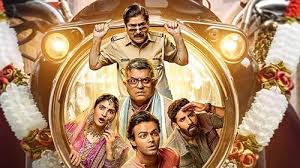Explore the most iconic Indian thriller films, their influence, storytelling craft, and how they compare globally. A must-read for cinephiles!
The Allure of Indian Thriller Cinema
Indian cinema is vast and varied, but thriller films hold a special place in the hearts of moviegoers. With tightly woven narratives, suspenseful plots, and emotional depth, Indian thrillers offer a unique cinematic experience. This article explores the most iconic Indian thriller films, examines how they borrow and adapt storytelling techniques, and reflects on their cultural significance in the evolving global film landscape.
Bollywood vs. Hollywood: How Thrillers Borrow and Adapt Stories
Cinematic DNA: Cross-Cultural Influences
Both Bollywood and Hollywood have borrowed heavily from each other. While Hollywood thrillers like “The Silence of the Lambs” or “Seven” influence Indian storytelling, Indian thrillers often bring in local color, cultural complexity, and emotional layering that make them distinct.
Adaptation with a Twist
Indian directors frequently reimagine global thriller templates. For example:
- “Kaun” (1999) by Ram Gopal Varma uses a single-location setting akin to Hitchcock’s work, yet the climax offers a cultural twist.
- “Drishyam” (2015) is inspired by real events and adapted from the Malayalam original, but its moral dilemma resonates deeply with Indian familial values.
Narrative Devices: From Whodunits to Psychological Twists
Indian thrillers often combine genres:
- Mystery: Films like “Talaash” blend police procedurals with supernatural elements.
- Psychological Thriller: “Andhadhun” (2018) cleverly mixes crime, suspense, and black comedy.
- Political Thrillers: “Madras Cafe” explores geopolitical themes rooted in India’s real history.
Top 10 Iconic Indian Thriller Films You Shouldn’t Miss
1. Andhadhun (2018)
A blind pianist caught in a murder plot. The film constantly misleads the audience, making it a masterclass in unreliable narration.
2. Kahaani (2012)
A pregnant woman in Kolkata searching for her missing husband. Vidya Balan’s powerful performance and a shocking climax define this modern classic.
3. Drishyam (2015)
A man covers up a crime to protect his family, raising ethical questions about justice. A slow-burn thriller that leaves a strong aftertaste.
4. Talvar (2015)
Based on the Aarushi Talwar case, this film delves into India’s flawed criminal investigation system. Razor-sharp screenplay by Vishal Bhardwaj.
5. Ratsasan (2018)
A Tamil-language thriller about a serial killer targeting schoolgirls. Tension and fear are built masterfully.
6. Psycho (2020)
A bold Tamil film that explores the psyche of a deranged killer while maintaining emotional depth.
7. Ugly (2013)
Anurag Kashyap’s gritty tale about a missing child highlights human flaws and systemic failure.
8. A Wednesday! (2008)
A gripping story of a common man challenging terrorism. A tight narrative packed with twists.
9. Special 26 (2013)
A heist thriller based on real-life events involving fake CBI officers. Intelligent and entertaining.
10. Game Over (2019)
A psychological thriller with horror elements that delve into trauma and survival. A unique storytelling experiment.
Cultural Storytelling: The Indian Touch
Emotional Core
Indian thrillers often focus on family, moral dilemmas, and societal dynamics. For instance, “Drishyam” is not just a crime thriller but a story about a father’s love and cunning.
Use of Music and Sound
Music isn’t just for songs. Thrillers like “Andhadhun” use background scores to manipulate tension, while silence is strategically used to heighten anxiety.
Local Settings, Universal Appeal
Films like “Kahaani” use cities like Kolkata not just as backdrops but as characters. The chaos, the culture, and the people become integral to the narrative.
Technology and Thrillers: AI, Data, and the New Age of Indian Cinema
The future of thrillers in Indian cinema will likely be shaped by new technologies:
- AI and Predictive Analytics: Studios are using data to understand audience preferences and predict which thriller plots will succeed.
- Advanced CGI and VFX: Enhances realism in high-stakes action thrillers.
- Streaming Platforms: Netflix, Amazon Prime, and Hotstar are encouraging bolder storytelling like in “Paatal Lok” and “Delhi Crime”.
The Global Rise of Indian Thrillers
Indian thrillers are no longer limited to domestic audiences. With global recognition at film festivals and platforms like Netflix, these films are gaining international acclaim.
Success Stories
- “Delhi Crime” won the International Emmy for Best Drama Series.
- “Raat Akeli Hai” brought noir-style filmmaking to Indian mainstream.
This global visibility pushes filmmakers to innovate further while staying rooted in local storytelling.
What Makes Indian Thrillers Iconic?
Indian thrillers stand out because they offer more than just suspense. They blend emotion, social commentary, and innovative storytelling techniques. Whether it’s a father shielding his family in “Drishyam” or a blind pianist navigating deceit in “Andhadhun,” these films leave a lasting impact.
With technology and global interest on the rise, the future looks promising. Indian thrillers are evolving, and with them, the global definition of what a thriller can be is expanding.
FAQ: Iconic Indian Thriller Films Breakdown
What defines an Indian thriller film?
An Indian thriller typically includes suspense, drama, emotional depth, and cultural elements that reflect Indian society.
Are Indian thrillers inspired by Western films?
Yes, many are inspired by global cinema but adapted with unique Indian twists, making them culturally relevant and fresh.
Where can I watch iconic Indian thrillers?
Platforms like Netflix, Amazon Prime Video, Disney+ Hotstar, and Zee5 host many top-tier Indian thrillers.
What was the first major Indian thriller?
Films like “Teesri Manzil” (1966) and “Jewel Thief” (1967) are early examples that paved the way for the genre.
Are there any underrated Indian thriller films?
Yes, films like “Manorama Six Feet Under,” “99,” and “Samay” didn’t get mainstream attention but are excellent thrillers.
Explore the thrilling world of Indian cinema, where every twist is more than a plot device—it’s a reflection of society, identity, and emotion.
